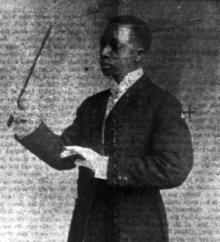Jimmy Mundy
| Jimmy Mundy | |
|---|---|
 | |
| Background information | |
| Birth name | James Mundy |
| Born |
June 28, 1907 Cincinnati, Ohio, U.S. |
| Died |
April 24, 1983 (aged 75) New York City, New York, U.S. |
| Genres | Jazz |
| Occupation(s) | Musician, composer, arranger |
| Instruments | Saxophone |
| Associated acts | |
James Mundy (June 28, 1907 – April 24, 1983) was an American jazz tenor saxophonist, arranger, and composer, best known for his arrangements for Benny Goodman, Count Basie, and Earl Hines.
Biography
Born in Cincinnati, Ohio, Mundy began developing his arranging skills in the 1920s while playing with local bands led by Erskine Tate, Tommy Miles, and Carroll Dickerson. In 1932 he wrote and sold a few arrangements to Claude Hopkins, and at about the same time joined Earl Hines' famous "Grand Terrace" ballroom band in Chicago. Hines hired him originally as a saxophonist, for whom he worked over the course of the next four years. During this period Mundy developed a reputation as a prolific arranger in the emerging "swing" style and began writing and selling arrangements to other bandleaders in order to supplement his income.
Late in 1935, Goodman and his band worked their way east to Chicago where they began their historic six-month booking in the Joseph Urban room of the Congress Hotel. After selling one of his arrangements to Goodman, Goodman hired Mundy on a full-time basis. Until 1938, Mundy became one of Goodman's principal staff arrangers, joining Spud Murphy and Fletcher Henderson. From the moment he was hired, it was Mundy upon whom Goodman relied to create up-tempo "flag-waving" musical numbers. Mundy's list of "killer-dillers" include the 1936 (revised) version of "Bugle Call Rag", "Jam Session" (an original composition by Mundy), and the band's 1937 adaptation of "Ridin' High". Mundy was adept at arranging standard popular tunes: "You Turned The Tables On Me" (1936) and "And the Angels Sing" (1939).
When Gene Krupa left the band in 1938, Mundy left shortly after as well to write for Krupa's new outfit, although he continued to contribute scores to Goodman on a free-lance basis. He briefly led his own band in 1939 and throughout the 1940s Mundy supplied a significant number of original compositions and arrangements to Count Basie (ca. 1940 to ca. 1947), Artie Shaw (1944–45), Dizzy Gillespie (1949), Harry James, Charlie Spivak, Paul Whiteman and many others. He wrote the score to the 1955 Broadway musical The Vamp which starred Carol Channing. The 1957 musical Livin' The Life and the 2010 dance revue Come Fly Away also used some of his music. In 1959, he moved to Paris, where he was musical director for Barclay Records. He returned to the U.S. in the 1960s and continued with his active career as a writer into the 1970s.
Death
Mundy died of cancer in New York City at the age of 75.[1]
Discography
- 1937–1947: Jimmy Mundy 1947–1947 (Classics)
- 1958: On a Mundy Flight (Epic)
- 2002: Fiesta in Brass (Golden Era)
As arranger
- With Chet Baker
- Baker's Holiday (Limelight, 1965)
With Al Hibbler
- After the Lights Go Down Low (Atlantic 1957)
With Illinois Jacquet
- The Soul Explosion (Prestige, 1969)
With Harry James
- Harry James And His Orchestra 1948-49 (Big Band Landmarks – Vol. X & XI, 1969)[2]
With Sonny Stitt
- Sonny Stitt & the Top Brass (Atlantic, 1962)
- Little Green Apples (Solid State, 1969)
- Come Hither (Solid State, 1969)
Notes
- ↑ "Jimmy Mundy, Musician, 75; Arranger for Leading Bands". The New York Times. United Press International. April 26, 1983.
- ↑ "Harry James And His Orchestra – Harry James And His Orchestra 1948-49". Discogs. Retrieved 20 December 2016.
References
- Carr, Ian; Fairweather, Digby; Priestley, Brian (1995). Jazz: The Rough Guide. Rough Guides. ISBN 978-1858281377.
- Cook, Richard; Morton, Brian (2004). The Penguin Guide to Jazz on CD: Seventh Edition. Penguin Books. ISBN 978-0141014166.
- Yanow, Scott (2000). Swing : Third Ear - The Essential Listening Companion. Backbeat Books. ISBN 978-0879306007.
External links
- Jimmy Mundy at AllMusic
- Jimmy Mundy discography at Discogs
- Jimmy Mundy at the Internet Broadway Database
